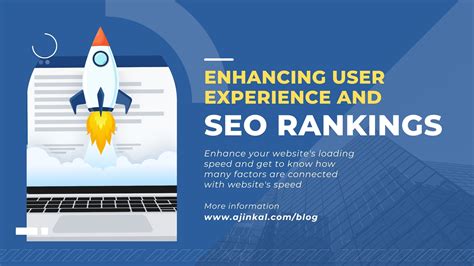As a website owner, you understand the importance of attracting visitors to your online platform. Whether you run a business website, a personal blog, or an e-commerce store, the success of your online presence hinges on the number of people who can find your site. In today's digital age, search engines play a crucial role in driving traffic to websites. Therefore, it is essential to optimize your website to improve its search engine visibility.
When it comes to enhancing your website's search engine ranking, there are various strategies you can employ. From on-page optimization to off-page techniques, it's important to have a comprehensive approach that covers all aspects of search engine optimization (SEO). By making your website more visible to search engines, you increase its chances of appearing higher in search results, ultimately attracting more organic traffic.
Keywords are fundamental in improving your website's search engine ranking. Understanding your target audience and the specific words they use when searching for information is crucial. Incorporating relevant keywords throughout your website's content, including in titles, headings, and meta descriptions, helps search engines recognize the relevance of your site. However, it is important to maintain a natural flow of language and avoid keyword stuffing, which can harm your ranking.
Another vital aspect of optimizing your website is to ensure it is user-friendly and provides an exceptional browsing experience. This includes having a clear site structure, easy navigation, and fast-loading pages. Search engines prioritize websites that are easy to navigate and provide valuable content to users. Additionally, ensuring your website is accessible across different devices, such as mobile phones and tablets, is key to attracting a broader audience and improving your search engine ranking.
Enhancing Your Website's Visibility in Search Results

Get ready to boost your website's online presence and improve its positioning on search engine results pages! By employing strategic techniques and optimizing various aspects of your website, you can enhance its visibility to search engines and increase the likelihood of attracting target audiences.
1. Conducting Keyword Research and Analysis
- Uncover the most relevant keywords and phrases that are frequently used by your target audience. This will allow you to tailor your content to their search preferences.
- Utilize keyword research tools to identify high-performing keywords with low competition, giving you a greater chance of ranking well for those terms.
- Strive for a diverse keyword set, incorporating synonyms and variations to capture a wider range of user search queries.
2. Creating Engaging and Valuable Content
- Ensure that the content on your website is unique, informative, and valuable to your audience. Engaging content entices visitors to spend more time on your site, increasing its visibility to search engines.
- Address your visitors' needs and provide solutions to their problems. This will establish your website as an authoritative source and attract more organic traffic.
- Incorporate relevant keywords naturally throughout your content, optimizing the copy for search engines without compromising its readability and user-friendliness.
3. Optimizing On-Page Elements
- Optimize your meta tags, including the title tag and meta description, by incorporating relevant keywords and enticing users to click through from search results.
- Ensure that your website's URL structure is clean and descriptive, making it easier for search engines to understand and rank your pages.
- Improve your website's loading speed by optimizing images, minifying code, and leveraging browser caching. A faster website not only enhances user experience but also boosts search engine rankings.
4. Building High-Quality Backlinks
- Focus on acquiring backlinks from reputable and authoritative websites in your industry. These backlinks signal to search engines that your website is trustworthy and valuable, improving its ranking.
- Create compelling and shareable content that naturally attracts backlinks from other websites. This could include infographics, case studies, expert guides, or industry reports.
- Regularly monitor and disavow low-quality or spammy backlinks that may negatively impact your website's ranking.
By implementing these strategies and continuously monitoring your website's performance, you can optimize it for better search engine ranking, attract more organic traffic, and increase your online visibility.
Understanding the Essentials of SEO
When it comes to boosting your website's visibility and organic traffic, having a solid understanding of the fundamental principles behind Search Engine Optimization (SEO) is crucial. Comprehending the key concepts and techniques used to optimize your website for search engines can significantly impact your online presence and improve the chances of reaching your target audience effectively.
To delve into the basics of SEO, it is essential to grasp the significance of keywords. Keywords play a vital role in your website's visibility on search engine result pages (SERPs) as they are the terms and phrases that users type into search engines when looking for specific information. Successful keyword research and integration throughout your website's content can help search engines understand the relevance of your site to these queries and increase its ranking in search results.
- Keyword research: Identifying relevant and high-traffic keywords is the foundation of effective SEO. Using keyword research tools, analyzing your competitors, and understanding your target audience's search behaviors can assist you in discovering the most valuable keywords for your website.
- On-page optimization: Implementing your target keywords strategically in your title tags, meta descriptions, headings, and content is crucial for on-page optimization. Properly structuring your website, optimizing URLs, and ensuring well-written and engaging content aligned with user intent will contribute to better search engine rankings.
- Link building: Building high-quality, authoritative backlinks is a significant factor in SEO success. Acquiring links from reputable websites signals search engines about your website's credibility and relevance. Developing a comprehensive link-building strategy that includes guest posting, outreach, and content promotion can help improve your website's visibility.
- User experience: Optimizing user experience is an essential part of SEO. Search engines prioritize websites that provide a positive experience for users. Factors such as site speed, mobile responsiveness, intuitive navigation, and valuable content contribute to a positive user experience and can positively impact your search engine rankings.
- Regular monitoring and optimization: SEO is an ongoing process that requires constant monitoring and refinement. Analyzing your website's performance through tools like Google Analytics and regularly optimizing your content based on data and trends can help you stay ahead in the competitive online landscape.
By familiarizing yourself with these fundamental aspects of SEO, you can lay a strong foundation for optimizing your website and improving its visibility in search engine rankings. Investing time and effort into understanding and implementing these principles will set you on the path to online success.
Optimizing Your Website with Effective Keyword Selection

In order to strategically position your website in search engine results and attract more organic traffic, it is essential to choose the most suitable keywords. These keywords act as the foundation for your website's visibility and play a critical role in determining its success.
Understanding the Importance of Keyword Selection
When it comes to improving your website's search engine ranking, selecting the right keywords is key. Keywords are the words or phrases that users enter into search engines when looking for specific information or solutions. By targeting the most relevant and frequently searched keywords, you increase your chances of appearing on search engine result pages.
Choosing keywords with high search volumes and low competition can give your website a competitive advantage in the online landscape.
Identifying Relevant Keywords
Begin by brainstorming a list of potential keywords that are relevant to your website and its content. Consider the terms you would use to describe your products, services, or the main focus of your website. Put yourself in the shoes of your target audience and think about the words or phrases they would likely use when searching for what you offer.
Researching and analyzing the keywords your competitors are using can provide valuable insights and help you identify untapped opportunities.
Evaluating Keyword Metrics
Once you have a list of potential keywords, it is crucial to evaluate their performance metrics. These metrics include search volume, competition level, and relevance to your website's content. Tools like Google Keyword Planner or SEMrush can assist you in determining the search volume and competition for specific keywords.
Choosing keywords with a moderate search volume and lower competition can yield better results compared to targeting highly competitive keywords.
Optimizing Your Website with Chosen Keywords
Once you have selected the most appropriate keywords for your website, it is time to optimize your content using them. Incorporate the chosen keywords naturally into your website's meta tags, headings, page titles, URLs, and throughout the body of your content. However, it is crucial to maintain a balance and avoid overusing or "stuffing" keywords, as this can lead to penalties from search engines.
Regularly reviewing and updating your chosen keywords based on performance analysis will ensure your website remains optimized and competitive.
In conclusion, choosing the right keywords for your website is a critical aspect of improving its search engine ranking. By understanding the importance of keyword selection, identifying relevant keywords, evaluating their metrics, and optimizing your website accordingly, you can increase your online visibility and attract more organic traffic.
Creating Compelling Content that Captivates Users
When it comes to enhancing your digital presence, one crucial element that shouldn't be overlooked is the creation of top-notch content that captivates and engages your target audience. Crafting high-quality content is not just about delivering information; it's about connecting with users on a deeper level and leaving a lasting impact.
Building a Strong Foundation:
In order to create compelling content, it's essential to lay a solid foundation by thoroughly understanding your target audience. Dive into their interests, preferences, and pain points, and use this knowledge to tailor your content specifically to their needs. By doing so, you can ensure that your content resonates with them and sparks their curiosity.
Captivating with Creativity:
In a cluttered online world, unique and creative content stands out from the crowd. Engage your audience by presenting information in innovative ways, such as using interactive elements, visual aids, or storytelling techniques. This not only grabs their attention but also enhances their overall user experience, making them more likely to stay on your website and explore further.
Delivering Value and Relevance:
High-quality content not only entertains but also provides value and answers to users' questions. Make sure your content is relevant, informative, and trustworthy. Conduct comprehensive research, cite credible sources, and present information in a clear and concise manner. Users are more likely to engage with content that they find useful, reliable, and informative.
Encouraging User Interaction:
An active and engaged audience not only indicates the success of your content but also contributes to improved search engine rankings. Encourage users to interact with your content by asking questions, including call-to-action statements, and responding to comments and feedback. This not only creates a sense of community but also boosts user engagement and encourages them to share your content with others.
Optimizing for Search Engines:
While creating captivating content is essential for engaging users, incorporating search engine optimization (SEO) techniques is equally important. Research relevant keywords, optimize your headlines and meta tags, and structure your content using headers and subheadings. By implementing effective SEO practices, your high-quality content can reach a wider audience and improve your website's visibility in search engine results.
In conclusion, by creating compelling and high-quality content that captivates users, you can effectively engage your target audience, increase their time spent on your website, and ultimately improve your website's search engine ranking. Remember, resonating with users on a deeper level goes beyond delivering information – it's about providing value, relevance, and a memorable experience.
Enhancing Website Speed and Enhancing User Experience

Enhancing the performance and user experience of your website are essential factors in achieving optimal results online. In this section, we will explore various strategies and techniques to boost your website's speed and improve user engagement, ultimately leading to increased satisfaction and higher conversion rates.
Optimize Website Loading Time
One crucial aspect of improving website speed is optimizing the loading time. Decreasing the time it takes for your website to load benefits both user experience and search engine rankings. You can achieve this by minimizing HTTP requests, optimizing images, and leveraging browser caching.
Minimize HTTP Requests
Reducing the number of HTTP requests helps your website load faster. To accomplish this, combine multiple scripts into one and minimize the use of external resources such as CSS and JavaScript files. Additionally, consider implementing content delivery networks (CDNs) to serve static resources from servers located closer to your users.
Optimize Images
Images are often a significant cause of slow loading times. To optimize images, resize them to the appropriate dimensions, select the optimal file format (JPEG for photos, PNG for graphics), and compress them without compromising quality. Implement lazy-loading techniques to load images only when they are visible to the user.
Leverage Browser Caching
By enabling browser caching, you can store frequently viewed resources on a user's device. This allows subsequent visits to your website to load faster, as the browser retrieves cached files instead of downloading them again. Set the appropriate caching headers in your server configuration or leverage caching plugins for popular content management systems.
Improve User Engagement
Enhancing user engagement involves creating a seamless and enjoyable browsing experience. When users find your website easy to navigate, visually pleasing, and informative, they are more likely to stay longer and interact with your content. Consider the following strategies to improve user engagement:
Enhance Navigation
Ensure your website has a clear and intuitive navigation structure. Implement breadcrumbs, a sitemap, and a search functionality to help users find what they are looking for quickly. Optimize the placement and labeling of navigation elements to minimize confusion and make the browsing experience seamless.
Optimize Mobile Responsiveness
With the increasing number of users accessing the internet through mobile devices, optimizing your website for mobile responsiveness is crucial. Make sure your website is mobile-friendly, loads quickly on mobile devices, and provides a seamless browsing experience across different screen sizes.
Create Engaging and Informative Content
High-quality, engaging, and informative content plays a significant role in keeping users engaged and encouraging them to explore more. Create captivating headlines, break content into readable chunks, and incorporate multimedia elements such as images and videos to enhance the overall user experience.
Ensure Fast and Reliable Website Hosting
Choose a reputable and reliable web hosting provider that offers fast server response times and ensures minimal downtime. A slow or unreliable hosting service can significantly impact your website's speed and user experience. Regularly monitor your website's performance and consider upgrading your hosting plan if necessary.
Improving your website's speed and user experience is a continuous process that requires attention to detail and staying up to date with current best practices. By implementing the strategies mentioned in this section, you can enhance both user satisfaction and the overall success of your website.
FAQ
What is search engine ranking?
Search engine ranking refers to the position in which your website appears in the results of a search engine query. It determines the visibility of your website to users searching for relevant keywords.
How important is search engine ranking for a website?
Search engine ranking is crucial for a website as it directly impacts its visibility and organic traffic. Higher rankings increase the chances of users visiting the site, leading to more opportunities for conversions and business growth.
What are some effective strategies to improve search engine ranking?
There are several strategies you can employ to improve your website's search engine ranking, including optimizing your content with relevant keywords, building high-quality backlinks, improving website speed and user experience, and regularly updating and promoting your website through quality content.



